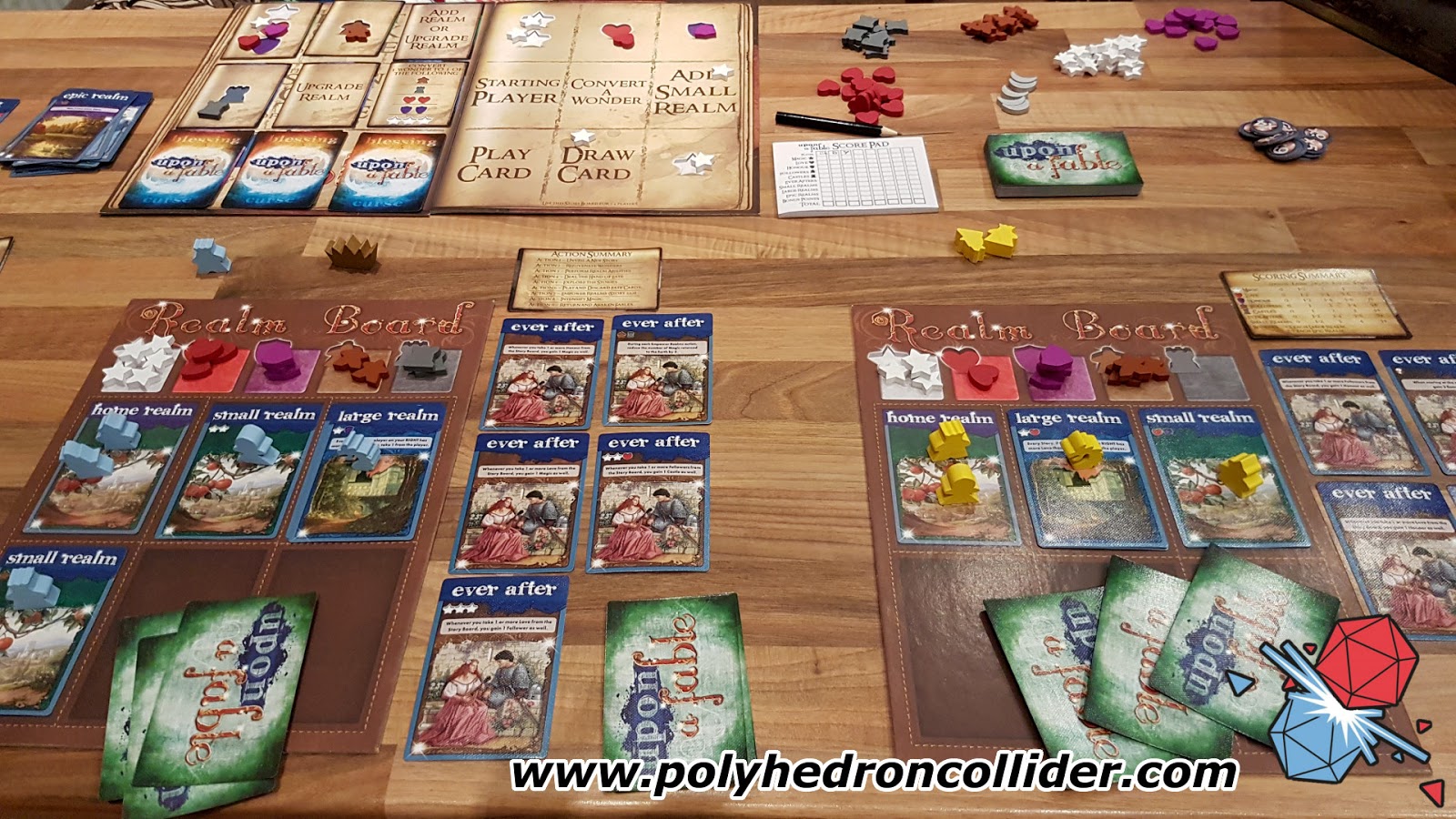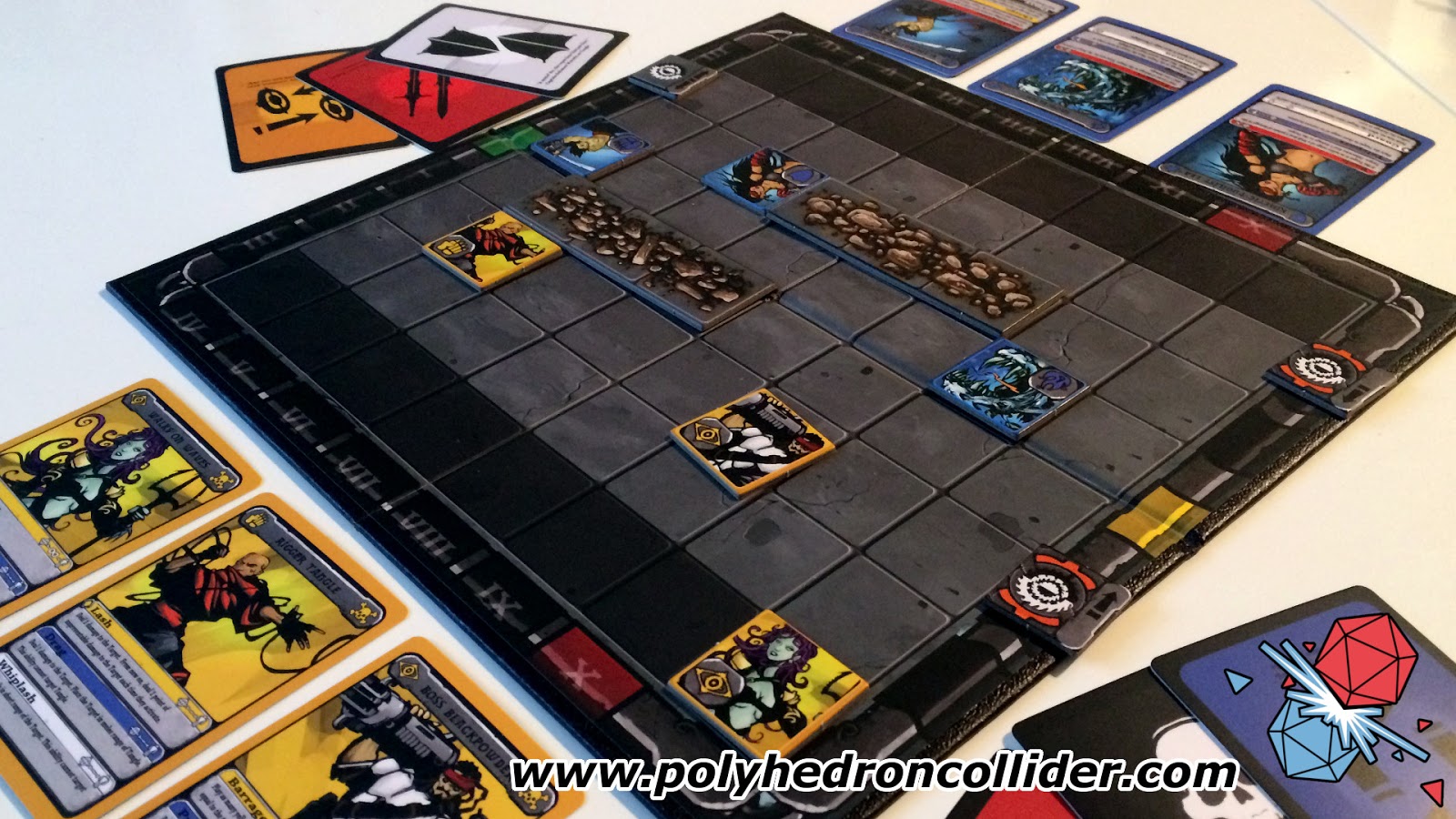Over the years we have been sent a number of review copies of games that have slipped through the net. It’s an embarrassment, it's unprofessional, its ramshackle, but there is a reason these games have remained unreviewed, they have struggled to even get to the table. Some of them are boring, some are uninspiring and some are just plain bad but it's our duty as honest reviewers to tell you why we just don’t like this set of games.
Titan Tactics
It seems a bit cruel including Titan Tactics in a roundup of flat games, because rule wise this little box actually packs in a lot of punch. Titan Tactics is a two-player arena battle game of the kind usually reserved for miniatures games but everything is represented in cardboard tokens rather than shiny miniatures and based on the premise that Titan Tactics appears to be aiming to ape these bigger games in a smaller, cheaper box it does rather well.
Titan Tactics’ problem is not the rules, it's not the comic book inspired art, it's not even the tug-of-war scoring system (which is actually rather clever), it's that the game is just so uninspiring. It's a game you play, say to yourself, “hey that was pretty cool” and then the game gets packed away and put back on the shelf and while you did enjoy it while you played it, there is little desire to take the game off the shelf and play it again.
- SteveFrantic
One of the things I’ve found recently is that there are some bad rulebooks out there. I’ve even re-written one because it was so bad. One of the primary reasons we have a rulebook is to learn about the game in question. When you play Frantic however, you’re in the minority for thinking reading the rules would teach you the game. Quite the opposite - when we played, or tried to play Frantic, Steve and I were befuddled right from the off. So, we did the natural thing and consult the designers.
“Have you played Uno? It’s like that” we were informed. Now, when you need to have played another game to understand the one you’re trying to play, that’s usually a sign that the designers need to go to their room and think about what they’ve done. In this case, they’ve taken Uno (and let’s be fair, Uno is hardly the 2nd coming of Jesus in gaming form) and made it flabbier and less attractive. Stick to Uno. At least the rules make sense.
- AndyHave at Thee
Have at Thee conjures up images of daring swashbuckling duels, where dashing young nobles attempt to outwit their opponents with lightning fast reflexes and razor-sharp wit.
YOU FIGHT LIKE A COW!- Andy
Yes Andy, thanks for that, but you get the idea.
Unfortunately, this quick and tiny card game is nothing of the sort. You simply play a card to attack your opponent, who gets to play a defence or an ouch card… and that's it. Have at Thee is actually less complicated than rock, paper, scissors, because all you can play is the scissors and hope your opponent has ran out of rocks. Have at Thee’s only redeeming feature is that is takes only a few minutes to play so it's over and done with quickly, never to be played again.
- SteveUpon a Fable
It’s no secret that I’m fond of worker placement games. My Stonemaier collection is testament to that, but I will admit that on occasion it’s tough to marry theme and mechanics in such games. The good ones manage it well. The bad ones, not so much. Upon A Fable’s theme and mechanics may as well be on separate continents for all it matters. Whilst the idea and theme are very lovely, you could reskin the entire game about a supermarket food distribution network and the mechanics could remain precisely the same.
 Going through the motions of placing stars, honour and love sounds great, but they lack any real meaning without a link to the theme. Why does it matter? It makes the game unappealing as you’re not connected to the story via the mechanics and ultimately, Upon a Fable just feels flat and at worst, it commits the cardinal sin of being just plain boring.
Going through the motions of placing stars, honour and love sounds great, but they lack any real meaning without a link to the theme. Why does it matter? It makes the game unappealing as you’re not connected to the story via the mechanics and ultimately, Upon a Fable just feels flat and at worst, it commits the cardinal sin of being just plain boring.Sopio
Hands up who likes Munchkin? Put your hand down Jon. We can all agree that Munchkin really is a pretty terrible game, and I’m here to say that Sopio is better than Munchkin, but only just.
Sopio is simply a game where you play a card on either yourself or your opponent, with each card providing +/- 100 points or 500 points or some other ludicrous amount. Each card is also adorned with a little pun and a crudely drawn stick man art. These do at least raise a smile, if only the first time you see them.
And that's it. There’s no strategy and no planning, just luck. Play the good cards on yourself and the bad cards on your opponents. Sopio’s main advantage over Munchkin is that when the deck runs out the game is over, which everyone at the table is very thankful for.
- Steve
These reviews are based on a full retail copy of the game provided by the publishers.




















0 comments:
Post a Comment